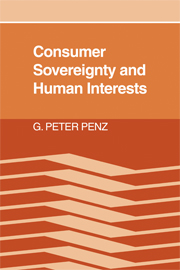Book contents
- Frontmatter
- Contents
- Preface
- Acknowledgments
- 1 Introduction
- Part I Consumer sovereignty
- Part II The range of wants
- Part III The quality of wants
- Part IV Measuring want satisfaction
- Part V Human interests and deprivation
- 8 Objective conceptions of human interests
- 9 Deprivation under market competition and other coordination mechanisms: an illustrative evaluation
- References
- Index
8 - Objective conceptions of human interests
Published online by Cambridge University Press: 25 October 2011
- Frontmatter
- Contents
- Preface
- Acknowledgments
- 1 Introduction
- Part I Consumer sovereignty
- Part II The range of wants
- Part III The quality of wants
- Part IV Measuring want satisfaction
- Part V Human interests and deprivation
- 8 Objective conceptions of human interests
- 9 Deprivation under market competition and other coordination mechanisms: an illustrative evaluation
- References
- Index
Summary
Human sovereignty
Human sovereignty and alternative conceptions of human interests
In order for the representation of interests to be suitable to the more ambitious tasks of evaluation and optimization, interests have to be formulated so that they are free from the inadequacies that afflict the want-satisfaction principle when used in that role. That formulation should not be subject to irrationality, it should transcend the evaluation circularity, and it should be measurable in such a way that the levels of interest fulfillment can be compared across individuals, situations, and systems. I will use the term “human interests” for those conceptions that meet these requirements. Human interests are those interests that are not contingent on particular economic systems, but apply regardless of the structure and process of production and distribution. In that sense, they are universal. (The aim here is to attain a perspective analogous to Rawls's [1971:260–3] “Archimedian point” for evaluating social practices, i.e., an evaluation that is “not contingent upon existing desires or present social conditions.”) When economic policies, institutions, or systems serve interests in this sense they will be said to serve “human sovereignty,” in distinction to consumer, private, or personal sovereignty. An economic system in which human sovereignty prevails is a system that serves human interests before any other goals.
However, before these comments raise excessive expectations or suggest that the impossible is being attempted, let me quickly add that no effort will be made to move beyond certain limits to comparability and thus to the systemic noncontingency of interests.
- Type
- Chapter
- Information
- Consumer Sovereignty and Human Interests , pp. 139 - 185Publisher: Cambridge University PressPrint publication year: 1986



